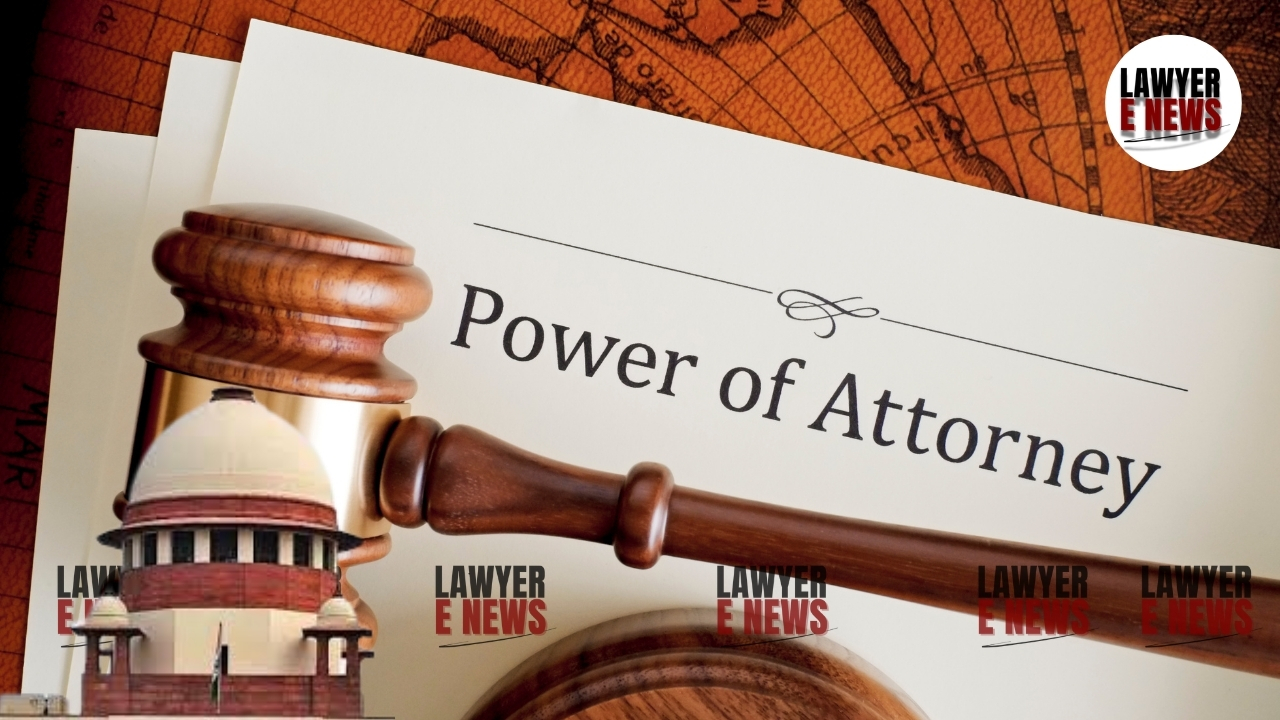-
by Admin
16 February 2026 1:47 PM



“Documents Which Themselves Do Not Create Title Cannot Be the Foundation for Title Claims”— In a significant judgment Supreme Court of India, comprising Justice J.B. Pardiwala and Justice R. Mahadevan, emphatically ruled that “an unregistered power of attorney coupled with an unregistered agreement to sell cannot convey ownership or title in immovable property.” The Court further held that any sale deed executed pursuant to a revoked power of attorney is non-est in law and void.
This decision came in the matter of Vinod Infra Developers Ltd. v. Mahaveer Lunia & Others, where the apex court set aside an order of the Rajasthan High Court that had rejected the appellant’s plaint under Order VII Rule 11 CPC, restoring the trial court’s earlier decision to proceed with the civil suit.
The case revolves around complex issues of ownership, title, and validity of sale deeds executed after the revocation of an unregistered power of attorney and an unregistered agreement to sell.
“No Sale Without a Registered Deed—Power of Attorney is Not a Title Document”: Supreme Court Restates Well-Settled Law
The Court made it unequivocally clear that “A power of attorney is not an instrument of transfer. It only enables an agent to act on behalf of the principal. Except in cases where the power is coupled with interest, it is revocable. And once revoked, any act performed thereafter is void.”
Quoting from its own landmark decision in Suraj Lamp & Industries v. State of Haryana, the Court reiterated:
“A contract for sale does not, by itself, create any interest in or charge on the property. Transfer of immovable property by way of sale can only be effected by a registered instrument. An agreement to sell, even coupled with possession, does not convey title.”
The appellant, Vinod Infra Developers Ltd., owned agricultural land in Jodhpur. In 2014, the appellant borrowed ₹7.5 crores from Mahaveer Lunia (Respondent No.1). As security, the appellant executed an unregistered power of attorney and an unregistered agreement to sell, authorising Respondent No.1 to deal with the property.
On 24th May 2022, the appellant’s board revoked the power of attorney. Nevertheless, on 13th and 14th July 2022, Respondent No.1 executed sale deeds in favour of himself and other respondents, which were registered on 19th July 2022, despite having no valid authority at that time.
The appellant filed a suit seeking:
Declaration that the sale deeds were void,
Possession of the property, and
A permanent injunction against the respondents from dealing with the property.
While the Trial Court refused to reject the plaint, the High Court reversed that decision, holding that the suit disclosed no cause of action.
“Revoked Authority Cannot Create Rights—Sale Deeds Executed Post-Revocation Are Void”: Supreme Court’s Sharp Observation
The Bench observed:
“Once the power of attorney was revoked on 24.05.2022 and 27.05.2022, any act of Respondent No.1 subsequent to that date was wholly without authority. The sale deeds dated 13.07.2022 and 14.07.2022 are, therefore, non-est.”
The Court further explained that the High Court “erred gravely by ignoring the second and distinct cause of action which arose from the post-revocation sale deeds.”
“Unregistered Agreements Do Not Convey Title—Can Only Be Basis for Specific Performance”
Relying on Sections 17, 23, and 49 of the Registration Act, 1908, and Section 54 of the Transfer of Property Act, 1882, the Court held:
“An agreement to sell does not create any right, title, or interest in the immovable property. The same principle applies to a power of attorney unless registered and backed by a valid agency.”
Quoting the ruling in S. Kaladevi v. V.R. Somasundaram, the Bench stressed:
“A document required to be registered, if unregistered, is inadmissible in evidence to prove transfer of ownership. It may only be used for collateral purposes or to support a suit for specific performance.”
The Court categorically noted that no suit for specific performance was ever filed by the respondents, rendering their claim to the property untenable.
“Civil Courts Are the Proper Forum—Mutation Does Not Confer Title”
Rejecting the respondents’ argument that the case fell within the jurisdiction of revenue courts under Section 207 of the Rajasthan Tenancy Act, 1955, the Court clarified:
“Revenue entries are for fiscal purposes. They neither create nor extinguish title. Questions of ownership, title, and validity of sale deeds are squarely within the jurisdiction of civil courts.”
“If One Cause of Action Survives, The Suit Cannot Be Rejected”
The Court applied the principle laid down in Central Bank of India v. Prabha Jain, observing:
“Even if part of the relief is untenable, the plaint cannot be rejected entirely if another cause of action survives. Partial rejection is impermissible under Order VII Rule 11 CPC.”
On Court Fee: “Deficiency Cannot Lead to Rejection Without Opportunity to Cure”
Citing Tajender Singh Ghambhir v. Gurpreet Singh, the Court reiterated:
“A plaint cannot be rejected solely for deficient court fee without affording the plaintiff an opportunity to rectify the deficiency. The High Court’s approach was contrary to this settled principle.”
Setting aside the High Court’s judgment, the Supreme Court ordered:
“The order of the Additional District Judge refusing to reject the plaint is restored. The trial court shall proceed with the suit on its merits, uninfluenced by any observations of this Court.”
The Court further directed that “the plaint be taken on file, and the suit proceed expeditiously.”
The judgment reinforces the long-standing legal principle that title to immovable property can only pass through a registered conveyance. A power of attorney, especially one revoked prior to any transaction, cannot be the basis of valid title.
The ruling also sends a strong message against misuse of procedural provisions like Order VII Rule 11 CPC to stifle genuine disputes that require adjudication on merits.
Date of Decision: 23 May 2025
